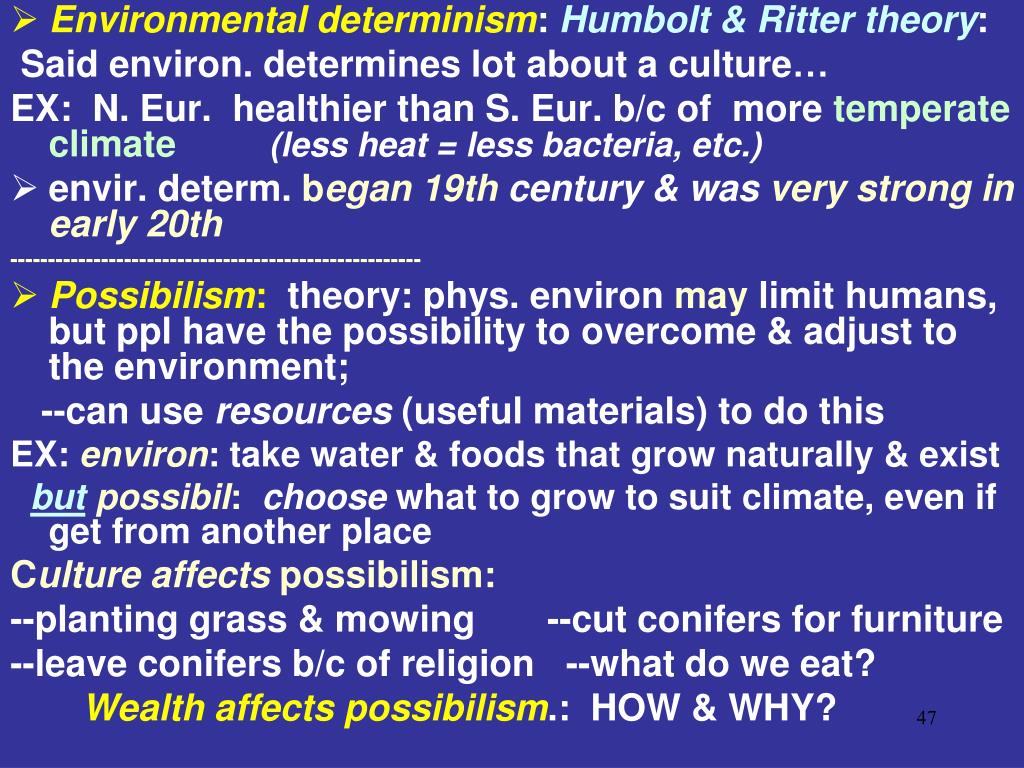

The moment we give them human association they are as changeful as human itself. The geographical elements of environment are fixed only in the narrow and special sense of the word. An element of one environment had been added to the elements, long fixed of many other environments…. The soil had not changed man man had gained a little more knowledge through a new plant. This theory says that the true and only geographical problem is. It is based upon the assumption that environment sets certain constraints or limitations, but culture is otherwise determined by social conditions. Possibilism is reaction to determinism and environmental determinism. Unlike determinism, which limits our education and development to one way, possibilism expands it to include alternatives.

These two plants largely changed the economy of Europe. Possibilism is an important perspective in human geography.
#DETERMINISM VS POSSIBILISM IN GEOGRAPHY TRIAL#
Their discovery raised the questions, “Are they useful to the rest of humanity and where can they be grown?” The whole known world was in a sense resurveyed by the rough processes of trial and error and the result has been astounding. The potato and maize plants were unknown to pre-Columbian Europe. ‘As knowledge of the world spread the association of event or condition with place widened, they became more complex, they had less or more significance with respect to mankind.

Specific examples that you may see on the AP® Human Geography exam could be: the French-speaking region of Canada, the dairying region of North America, or political. In his Geography and the Social Sciences, Bowman stated. The major opposing theory that has stood against determinism is the theory of possibilism, elaborated by the French historian, Lucien Febvre, in the mid-twentieth. Who is the founder of neo determinism Griffith Taylor proposed the concept of neo-determinism. The theory that the physical environment may set limits on human actions, but people have the ability to adjust to the physical environment and choose a course of action from many alternatives.

It is the theory of cultural ecology, and it is the study of human adaptation to social and physical environment with respect to biological as well as cultural processes.American geographer, Isaiah Bowman was a staunch admirer of the French possibilist paradigm. What is possibilism in AP Human Geography Possibilism. In order to better explain the development of human cultures with respect to the particular environment, a new theory was proposed, one that has been widely accepted and used. Physical environment caused social development.Ĭhange of body color of black pepper moth.Ĭultivation of land by ancient nomadic settlements. Cultural Ecology - geographic study of human-environment relationships. As the attributes of physical geography have their sway on. Physical environment and human cultures are interrelated. Answer (1 of 2): In geography curriculum, Geographic Thought is one interesting field dealing with such concepts as determinism, possiblism and probablism that are intended to explain the spatial phenomenon on the surface of the earth. Physical environment, especially climate, exclusively shapes human culture and behavior. Humans can alter the environment to best serve their needs, through the use of technology. They put forth these beliefs in the form of theories which claimed that the environment had deterministic effects on the nature of human society and culture. Till 1950, philosophers believed that human civilizations form and proliferate in certain parts of the world due to the direct influence of the natural physical environment found in those places. It also tries to understand the sociocultural evolution of humans based on the stimuli provided by their physical living conditions. Studies related to this field attempt to establish the human or natural factors underlying the environmental changes occurring at that site. Possibilism is the philosophy introduced by Fabvre, to explain man and environment relationship in a different way of determinism, taking man as an active. The study of the interactions between humans and their surroundings, and the observed effect of such interactions is called human geography. Yes, environmental problems do constrain human societies, but the societies’ responses also make a difference.” can see the virtue of possibilism or cultural and social determinism. “For anyone inclined to caricature environmental history as “environmental determinism”, the contrasting histories of the Dominican Republic and Haiti provide a useful antidote. anthropocentric approach and introduced geographical determinism in the early 19.


 0 kommentar(er)
0 kommentar(er)
